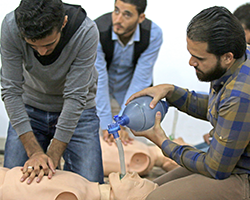Preparedness for emergencies

WHO
Health emergency preparedness in Europe means ensuring that all countries in the Region have the capabilities to manage any type of health emergency. Each country’s health system needs to be resilient and equipped to anticipate and effectively respond to the needs of populations affected by a crisis.
By identifying gaps in their capacities to detect, notify and respond to health emergencies, countries can target priority areas that need to be strengthened. By working across sectors and defining the health hazards they are most vulnerable to, they can develop national plans for emergency responses that are tailor-made to their unique social, political, financial and health system context.
Preparedness is a requirement for the 196 signatories to the International Health Regulations (IHR) (2005), the world’s defence against serious threats to public health. Systems must be capable of preventing, protecting against, controlling and providing a public health response to the international spread of disease which, in an interlinked world, can happen at unpredictable speed.
Investing in preparedness not only saves lives, but also protects societies and economies, strengthens health systems and contributes to WHO’s global efforts to protect 1 billion more people worldwide from health emergencies. WHO estimates that every US$ 1 invested in the health emergency cycle sees a return of over US$ 8, and a 5-year investment is projected to save 1.5 million human lives and produce US$ 240 billion of economic gain.
Country-level preparedness means that all sectors and systems are prepared to manage risks – at national and subnational levels, in communities, rural and urban settings, in health facilities, laboratories, emergency services and the health system overall. This includes building and maintaining capacities and capabilities in the below areas:
- Strategic risk assessments
- Emergency operations plan
- Specific contingency plans for priority hazards
- Influenza/pandemic preparedness
- Large public events planning
- Emergency risk communication




